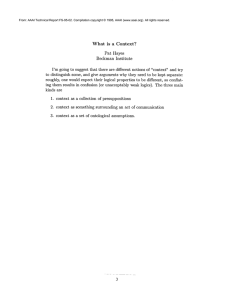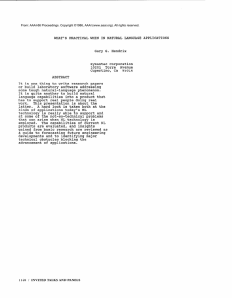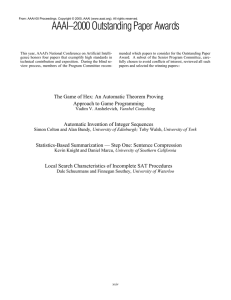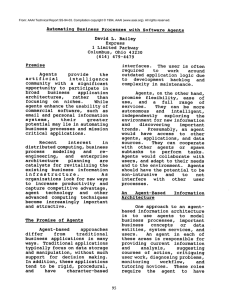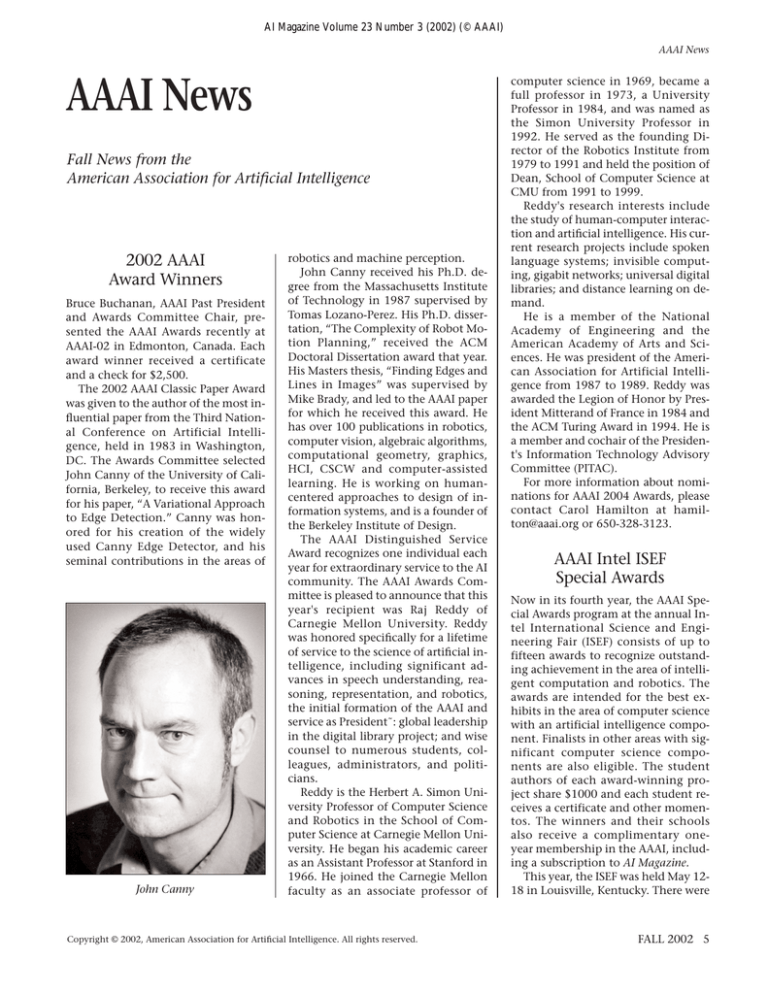
AI Magazine Volume 23 Number 3 (2002) (© AAAI)
AAAI News
AAAI News
Fall News from the
American Association for Artificial Intelligence
2002 AAAI
Award Winners
Bruce Buchanan, AAAI Past President
and Awards Committee Chair, presented the AAAI Awards recently at
AAAI-02 in Edmonton, Canada. Each
award winner received a certificate
and a check for $2,500.
The 2002 AAAI Classic Paper Award
was given to the author of the most influential paper from the Third National Conference on Artificial Intelligence, held in 1983 in Washington,
DC. The Awards Committee selected
John Canny of the University of California, Berkeley, to receive this award
for his paper, “A Variational Approach
to Edge Detection.” Canny was honored for his creation of the widely
used Canny Edge Detector, and his
seminal contributions in the areas of
John Canny
robotics and machine perception.
John Canny received his Ph.D. degree from the Massachusetts Institute
of Technology in 1987 supervised by
Tomas Lozano-Perez. His Ph.D. dissertation, “The Complexity of Robot Motion Planning,” received the ACM
Doctoral Dissertation award that year.
His Masters thesis, “Finding Edges and
Lines in Images” was supervised by
Mike Brady, and led to the AAAI paper
for which he received this award. He
has over 100 publications in robotics,
computer vision, algebraic algorithms,
computational geometry, graphics,
HCI, CSCW and computer-assisted
learning. He is working on humancentered approaches to design of information systems, and is a founder of
the Berkeley Institute of Design.
The AAAI Distinguished Service
Award recognizes one individual each
year for extraordinary service to the AI
community. The AAAI Awards Committee is pleased to announce that this
year's recipient was Raj Reddy of
Carnegie Mellon University. Reddy
was honored specifically for a lifetime
of service to the science of artificial intelligence, including significant advances in speech understanding, reasoning, representation, and robotics,
the initial formation of the AAAI and
service as President˜: global leadership
in the digital library project; and wise
counsel to numerous students, colleagues, administrators, and politicians.
Reddy is the Herbert A. Simon University Professor of Computer Science
and Robotics in the School of Computer Science at Carnegie Mellon University. He began his academic career
as an Assistant Professor at Stanford in
1966. He joined the Carnegie Mellon
faculty as an associate professor of
Copyright © 2002, American Association for Artificial Intelligence. All rights reserved.
computer science in 1969, became a
full professor in 1973, a University
Professor in 1984, and was named as
the Simon University Professor in
1992. He served as the founding Director of the Robotics Institute from
1979 to 1991 and held the position of
Dean, School of Computer Science at
CMU from 1991 to 1999.
Reddy's research interests include
the study of human-computer interaction and artificial intelligence. His current research projects include spoken
language systems; invisible computing, gigabit networks; universal digital
libraries; and distance learning on demand.
He is a member of the National
Academy of Engineering and the
American Academy of Arts and Sciences. He was president of the American Association for Artificial Intelligence from 1987 to 1989. Reddy was
awarded the Legion of Honor by President Mitterand of France in 1984 and
the ACM Turing Award in 1994. He is
a member and cochair of the President's Information Technology Advisory
Committee (PITAC).
For more information about nominations for AAAI 2004 Awards, please
contact Carol Hamilton at hamilton@aaai.org or 650-328-3123.
AAAI Intel ISEF
Special Awards
Now in its fourth year, the AAAI Special Awards program at the annual Intel International Science and Engineering Fair (ISEF) consists of up to
fifteen awards to recognize outstanding achievement in the area of intelligent computation and robotics. The
awards are intended for the best exhibits in the area of computer science
with an artificial intelligence component. Finalists in other areas with significant computer science components are also eligible. The student
authors of each award-winning project share $1000 and each student receives a certificate and other momentos. The winners and their schools
also receive a complimentary oneyear membership in the AAAI, including a subscription to AI Magazine.
This year, the ISEF was held May 1218 in Louisville, Kentucky. There were
FALL 2002 5
AAAI News
15 winning projects by 16 students
(one team). Eight projects were entered in the category of computer science, four in engineering, one in behavioral and social sciences, one in
earth and space sciences, and one in
mathematics. The 2002 winners are as
follows:
■ Jessie Cheng, Armonk, New York: “Com-
parison of Traditional and ASR-Mediated
Literacy”
■ Robert Kang Xing Jin, Silver Spring,
Maryland: “Automated Detection of
Boundaries in Microstructure Images”
■ Pascal Tom Getreuer, Colorado Springs,
Colorado: “Like a Mouse to Cheese”
■ Yilin Nie, Chappaqua, New York: “Using
Hidden Dynamic Models to Predict
Pitch in English and Mandarin”
■ Yindong Yu, Shanghai, China: “Com-
puter Recognition
Speech”
of
Emotion
in
■ Youngki Park, Jinju, Kyongsangnam-do,
South Korea: “Finding Solutions to the
Problem That Is Indicated for Last Twenty Years in IDA*”
■ Jennifer Pei-Kay Gee, Frederick, Mary-
land: “Prediction of HIV Treatment Responses Using Neural Networks”
■ Kimberly Elise Reinhold, Hilo, Hawaii:
“Artificial Neural Networks: Mechanisms
of Pattern Recognition and Learning”
■ Grant A. Elliott, Riviera Beach, Florida:
“Autonomous Structural Engineering
through Genetic Algorithms”
■ Ulyana N. Horodyskyj, Parma, Ohio:
“Evolution in Motion: Orbital Optimization Using Genetic Algorithms”
■ Joshua Brent Miller, Melbourne, Florida:
“Cooperative Autonomous Robotics Utilizing Ant Pheromone Behavior”
■ Colin Patrick O'Flynn, Hamilton, On-
tario, Canada: “Autonomous Hovercraft:
Power of Neural Nets”
■ Elena Leah Glassman, Doylestown, Penn-
sylvania: “Speech Imitation through Analysis, Synthesis, and Optimization”
■ Andrew Robert Pariser and Joseph Jailer-
Coley, Port Washington, New York:
“Creating More Efficient Multi-Robot
Systems Using Peer-to-Peer Networking
in Search and Retrieve Problems”
■ Chun-Chen Yeh, Chineses Taipei: “Win-
ning Strategies for Games Played with
Chips”
AAAI congratulates all the winners! In
addition, we would like to recognize
the judges, who attended the fair in
Louisville and selected the 15 winning
projects from many remarkable and
worthy entries. Many thanks to Reid
6
AI MAGAZINE
Simmons (chair) for his organizational
efforts, and to all the judges, David
Atkinson (head judge), Jet Propulsion
Laboratory (JPL), California Institute
of Technology, David Kortenkamp,
NASA Johnson Space Center/Metrica
Inc., Carla Gomes, Cornell University, and Sven Koenig, Georgia Institute of Technology, for their generous donations of time and energy.
IJCAI-03 and IAAI-03
The Eighteenth International Conference on Artificial Intelligence will be
held August 9–15, 2003 at the Acapulco Convention Center in Acapulco,
Mexico. AAAI is a cosponsor of this
conference. There will be no AAAI
conference in 2003. The Fifteenth
Conference on Innovative Applications of Artificial Intelligence (IAAI02) will be collocated with IJCAI in
Acapulco.
IJCAI-03 and IAAI-03 Calls for
Technical Papers, Poster Papers, Tutorial Proposals, Workshop Proposals,
and other related programs have been
mailed to all AAAI members. You can
also view this information and more
at www.ijcai-03.org (IJCAI-03) and
www.aaai.org/Conferences/IAAI/2003
/iaai03.html. Inquiries may be addressed to ijcai@aaai.org or iaai@aaai.
org.
The deadline for submission of
electronic papers to IJCAI-03 is January 14, 2003. IAAI-03 papers are due
by January 21, 2003. Please watch the
web sites for other announcements regarding the program in 2003.
Student Scholar and
Volunteer Program
AAAI is pleased to announce the continuation of its Student Scholar and
Volunteer programs. The Student
Scholar Program provides partial travel support for students who are fulltime undergraduate or graduate students at colleges and universities; are
members of AAAI; submit papers to
the conference program or letters of
recommendation from their faculty
advisor; and submit scholarship applications to AAAI by April 15, 2003. In
addition, repeat scholarship appli-
cants must have fulfilled the volunteer
and reporting requirements for previous awards. In the event that scholarship applications exceed available
funds, preference will be given to students who have an accepted technical
paper, and then to students who are
actively participating in the conference in some way. However, all eligible students are encouraged to apply.
After the conference, an expense report will be required to account for
the funds awarded. For further information about the Scholarship Program, or to obtain an application,
please contact AAAI at scholarships@
aaai.org, or 445 Burgess Drive, Menlo
Park, CA 94025. (650) 328-3123.
The Student Volunteer Program is
an essential part of the conference and
student participation is a valuable contribution. Volunteers will support IJCAI organizers in Acapulco, Mexico. In
2003, a limited number of complimentary technical program registrations
will be available for students who volunteer during the conference. Preference will be given to student scholars
for the volunteer positions. Local students or students not requiring travel
assistance can apply for the Volunteer
Program if openings are available.
AAAI membership is required for eligibility. For further information regarding the Student Volunteer Program,
please contact AAAI at volunteer@
aaai.org. The deadline for volunteer
applications is April 15, 2003.
Separate travel award programs are
available for international students
through IJCAI and other national societies. For information regarding any
of these international programs,
please write to Priscilla Rasmussen at
rasmusse@ijcai.org.
AAAI 2002
Fall Symposia
The American Association for Artificial Intelligence's 2002 Fall Symposium Series will be held Friday
through Sunday, November 15–17,
Sea Crest Conference Center in North
Falmouth, Massachusetts. The titles of
the five symposia are:
■ Chance Discovery: The Discovery and
Management of Chance Events
AAAI News
■ Etiquette for Human-Computer Work
■ Human-Robot Interaction
■ Intent Inference for Users, Teams, and
Adversaries
■ Personalized Agents
A general plenary session, in which
the highlights of each symposium will
be presented, will be held on Saturday,
November 16, and an informal reception will be held on Friday, November
15. Symposia will be limited to between forty and sixty participants.
Each participant will be expected to attend a single symposium. In addition
to invited participants, a limited number of other interested parties will be
allowed to register in each symposium
on a first-come, first-served basis.
Working notes will be prepared and
distributed to participants in each
symposium, but will not otherwise be
available unless published as an AAAI
Technical Report or edited collection.
The final deadline for registration is
October 18, 2002. For registration information, please contact AAAI at
fss@aaai..org or visit AAAI's web site at
www.aaai.org/Symposia/Fall/2002/fss02.html. A hotel room block has been
reserved at the Sea Crest Resort. The
cut-off date for reservations is October
10, 2002. Please call 800-225-3110 or
508-540-7602 for further information.
Fall Symposium Series for
2003 Cancelled
We regret to announce that AAAI has
decided to suspend the AAAI Fall Symposium Series until such time that the
pool of proposals warrants its reinstatement. We hope this will occur
very soon! All symposium proposals
should be submitted to the 2004
Spring Symposium Series, tentatively
scheduled for March 22–24 at Stanford
University. Inquiries regarding the series can be directed to Carol Hamilton
at sss@aaai.org.
2002 Spring Symposium
Series Call for Participation
AAAI presents the 2003 Spring Symposium Series, to be held Monday
through Wednesday, March 24-26,
2003, at Stanford University. The titles
of the eight symposia are:
■ Agent-Mediated Knowledge Manage-
ment
■ Computational Synthesis: From Basic
Building Blocks to High-Level Functionality
■ Foundations and Applications of Spatio-
Temporal Reasoning (FASTR)
■ Human Interaction with Autonomous
Systems in Complex Environments
■ Intelligent Multimedia Knowledge Man-
agement
■ Logical Formalization of Commonsense
Reasoning
■ Natural Language Generation in Spoken
and Written Dialogue
■ New Directions in Question Answering
Symposia will be limited to between
forty and sixty participants. Each participant will be expected to attend a
single symposium. Working notes will
be prepared and distributed to participants in each symposium. A general
plenary session, in which the highlights of each symposium will be presented, will be held on Tuesday, March
26, and an informal reception will be
held on Monday, March 25. In addition to invited participants, a limited
number of other interested parties will
be able to register in each symposium
on a first-come, first-served basis. Registration information will be available
by December 15, 2002. Please contact
AAAI at sss@aaai.org or visit our web
site at www.aaai.org/Symposia/Spring/
2003/sss-03.html.
Submissions for the symposia are
due on October 4, 2002. Notification
of acceptance will be given by November 8, 2002. Material to be included in
the working notes of the symposium
must be received by January 20, 2003.
The complete Call for Participation is
available at the URL listed earlier.
AAAI Executive Council
Nominations
Every two years, the AAAI membership elects an individual to serve a
two-year term as President-Elect, followed by two years as President, and,
finally, two years as immediate Past
President. In addition, every year four
new councilors are elected to serve
three-year terms on the AAAI Executive Council. All elected councilors are
expected to attend at least two council
meetings per year, and actively partic-
ipate in AAAI activities. Nominees
must be current members of AAAI.
The Nominating Committee encourages all regular members in good
standing to place an individual's
name before them for consideration.
(Student and library members are not
eligible to submit candidates' names.)
The Nominating Committee, in turn,
will nominate one candidate for President-Elect and eight candidates for
councilor in the spring. In addition to
members' recommendations, the committee will actively recruit individuals
in order to provide a balanced slate of
candidates. AAAI members will vote
in the late spring.
To submit a candidate's name for
consideration, please send the individual's name, address, phone number, and e-mail address to Carol
Hamilton, Executive Director, AAAI,
445 Burgess Drive, Menlo Park, CA
94025; by fax to 650/321-4457; or by
e-mail to hamilton@aaai.org.
Nominators should contact candidates prior to submitting their names
to verify that they are willing to serve,
should they be elected. The deadline
for nominations is November 1, 2002.
AAAI Membership
Fee Increase
AAAI will restructure its fee schedule
in 2003 for the first time since 1994.
The new fees, effective January 1,
2003, will be:
■ Regular US/Canada
$95
■ Full time Student US/Canada
■ Regular International
$35
$135
■ Full time Student International
$75
■ Library US/Canada
$190
■ Library International
$230
The life membership fee is under review and the new fee will be posted on
the web site in October. Current individual memberships include the AI
Magazine, conference and publication
discounts, and online access to the
AAAI Digital Library. AAAI will also institute a new category of membership
for library access to the AAAI Digital
Library in 2003. For further information, please write to membership
@aaai.org.
FALL 2002 7
AAAI News
AAAI Member News
AMERICAN ASSOCIATION FOR ARTIFICIAL INTELLIGENCE
STATEMENT OF FINANCIAL POSITION
DECEMBER 31, 2001
ASSETS
CURRENT ASSETS:
Cash
Investments - Stated at Fair Market Value (Note 1A & 3)
Accounts Receivable - Trade
Inventory (Note 1B)
Prepaid Expenses & Advances
Prepaid Expenses - Future Events
$
TOTAL CURRENT ASSETS
449,324
9,071,883
36,502
260,831
15,617
30,467
9,864,624
Furniture, Fixtures & Equipment, Net (Note 1C)
49,248
5,279
Deposits
$ 9,919,151
LIABILITIES AND NET ASSETS
CURRENT LIABILITIES:
Accounts Payable and Accrued Expenses
Unearned Membership Fees (Note 4)
TOTAL CURRENT LIABILITIES
$
216,684
214,785
431,469
9,487,682
Net Assets - Unrestricted
$ 9,919,151
AMERICAN ASSOCIATION FOR ARTIFICIAL INTELLIGENCE
STATEMENT OF CASH FLOWS
FOR THE YEAR ENDED DECEMBER 31, 2001
Cash Flows From Operating Activities:
Net (Decrease) in Net Assets
Adjustments to Reconcile Change in Net Assets to Net Cash Flows From Operations:
Depreciation Expense
Net Increase in Accounts Receivable
Net Increase in Inventory
Net Decrease in Prepaid Expenses
Net Increase in Accounts Payable
Net Increase in Unearned Membership Fees
Net Unrealized and Realized Loss on Investments
Net Cash Flows From Operating Activities
$(2,313,356)
19,669
(30,968)
(20,990)
71,891
97,295
4,063
1,319,197
(853,199)
Cash Flow From Investing Activities:
Purchase of Furnishings & Equipment, Net
Sale of Investments, Net of Purchases of Investments
Net Cash Flow From Investing Activities
697,702
Net Increase (Decrease) in Cash
(155,497)
Cash -January 1, 2001
Cash - December 31, 2001
8
(8,847)
706,549
AI MAGAZINE
604,821
$ 449,324
Ron Brachman, President-Elect of
AAAI, has been appointed as the director of DARPA's Information Processing
Technology Office (IPTO). Brachman
will manage the new DARPA Cognitive Information Processing Technology Initiative, which will develop the
next generation of computational systems with radically new capabilities.
“Cognitive systems” will demonstrate
levels of autonomy and reasoning far
beyond those of today’s systems.
Aravind Joshi is the winner of the
third annual David E. Rumelhart Prize.
This announcement was made at the
Cognitive Science Society meeting at
George Mason University on August 9,
2003. The Rumelhart prize is given
each year to a cognitive scientist to
honor his or her outstanding contributions to the formal analysis of human cognition. This prize was created
by the Glushko-Samuelson Foundation to honor David E. Rumelhart, a
cognitive scientist who exploited a
wide range of formal methods to address issues and topics in Cognitive
Science. Joshi will receive his award
and give a talk at the twenty-fifth annual meeting of the Cognitive Science
Society in Boston, MA, in August of
2003. For a more detailed discussion of
the prize and of Joshi's work, please
see www.cnbc.cmu.edu/derprize/announce2003.html.
Independent
Auditor’s Report
I have audited the statement of financial position of American Association
for Artificial Intelligence as of December 31, 2001, and the related statements of activities, changes in net assets and cash flows for the year then
ended. These financial statements are
the responsibility of the Association’s
management. My responsibility is to
express an opinion on these financial
statements based on the audits.
I conducted the audits in accordance with generally accepted auditing
standards. Those standards require
that I plan and perform the audit to
obtain reasonable assurance about
whether the financial statements are
free of material misstatement. An audit
AAAI News
AMERICAN ASSOCIATION FOR ARTIFICIAL INTELLIGENCE
STATEMENT OF ACTIVITIES AND CHANGES IN NET ASSETS
FOR THE YEAR ENDED DECEMBER 31, 2001
Changes in Net Assets: Gross Profit (Loss), By Activity:
AI Magazine Revenue
AI Magazine Expenses
$ 16,944
( 197,216)
$ (180,272)
lative effect of the change in accounting
principle from prior years was shown as
an extraordinary item on the statement
of Activities for the year ended December 31, 1996. Since investments are stated at fair market value realized
and unrealized gains and losses are
combined on the statement of activities
where in years prior to 1996 only realized gains and losses were shown.
Memberships Revenue (Note 4)
Memberships Expenses
268,796
(133,537)
135,259
AAAI Press Revenue
AAAI Press Cost of Sales
88,582
(135,876)
(47,294)
Spring Symposium 2001 Revenue
Symposium Expenses
70,516
(69,376)
1,140
Fall Symposium 2001 Revenue
Symposium Expenses
36,953
(55,057)
(18,104)
Conference Service Fees
Conference Service Salaries
53,600
(53,600)
-0-
Technical Program ‘01 Revenue
Program Expenses
512,324
(500,970)
11,354
2001 Tutorials Revenue
Tutorials Expenses
84,399
(94,754)
(10,355)
C. Furniture, Fixtures and Equipment: Furniture, fixtures and equipment are stated
at cost, less accumulated depreciation.
Depreciation is computed on the
straight-line method over estimated
useful lives of five to ten years. Furniture, fixtures and equipment consist of
the following at December 31, 2001.
Cost
$ 210,817
2001 Exhibits Revenue
Exhibits Expenses
30,071
(27,340)
2,731
Accumulated depreciation (161,569)
Net
$ 49,248
51,044
(103,380)
(52,336)
28,230
(43,988)
(15,758)
2001 Workshops Revenue
Workshops Expenses
2001 IAAI Revenue
IAAI Expenses
Prior Year Events Expenses
KDD Sponsorship
Interest & Dividend Income (investments & cash accounts)
Realized & Unrealized Gains (loss) on Investments (Note 1A)
Investment Management Fees
Grants & Scholarships Expended
Gross Profit (Loss), Combined
Operating Expenses
Net (Decrease) in Net Assets
(9,338)
11,640
322,263
(1,319,197)
(104,723)
(405,117)
(1,678,107)
(635,249 )
(2,313,356)
Net Assets - January 1, 2001
11,801,038
Net Assets - December 31, 2001
$ 9,487,682
includes examining, on a test basis,
evidence supporting the amounts and
disclosures in the financial statements.
An audit also includes assessing the accounting principles used and significant estimates made by management,
as well as evaluating the overall financial statement presentation. I believe
that the audits provide a reasonable
basis for my opinion.
In my opinion, the financial statements referred to above present fairly,
in all material respects, the financial
position of American Association for
Artificial Intelligence as of December
31, 2001 and the results of operations
and cash flows for the year then ended, in conformity with generally accepted accounting principles.
Notes to Financial Statements
Note 1: Summary of Significant Accounting Policies.
A. Method of Accounting: The financial
statements are presented on the accrual
basis of accounting.
Effective for 1996 the Association has
changed its method of accounting for
investments from “original cost” to
“fair market value” as required by the
provisions of Statement of Financial Accounting Standards No. 124. The cumu-
B. Inventory: Magazine, proceedings, conference books and publications in process inventory is valued at the lower of
cost or market value as of December 31,
2001.
D. Income Taxes: American Association for
Artificial Intelligence is exempt from income taxes on its earning from investments and its exempt function operations under Section 501(c)(3) of the
Internal Revenue Code and Section
23701(d) of the California Revenue and
Taxation Code. Federal and California
taxes were paid during 2001 on earnings from sales of mailing lists and advertising.
Note 2: Operations
The American Association for Artificial Intelligence (AAAI) was formed in 1979 as a
scientific society, to encourage the basic
knowledge of what constitutes intelligent
thought and behavior and how it can be
exhibited in computers. This is accomplished by the AI Magazine, the publications of the AAAI Press, the National Conference on Artificial Intelligence (NCAI),
the Conference on Innovative Applications of Artificial Intelligence (IAAI), the
International Conference on Knowledge
Discovery and Data Mining, the Mobile
Robot Competition, the Symposium Series, and the AAAI Workshop Program. In
addition, AAAI has an extensive program
for student scholarships, women and minority grants, and sponsorship of independent workshops and conferences. Finally,
AAAI’s World Wide Web Site serves as a
central resource for individuals involved in
AI research.
Note 3: Investments at
December 31, 2001
Investments are stated at fair market value
FALL 2002 9
AAAI News
The AAAI Intel ISEF Science Winners
since it is readily determinable and the investments are not necessarily being held to
any maturity. Realized and unrealized gains
and losses are reported in the statement of
activities.
Investment activity for 2001 is as follows:
Investments Beginning of year
(At fair market value)
Unrealized &
Realized gains (Loss)
Interest & Dividends
(Investments only)
Total Return
On Investments
Purchases of Investments
$ 11,097,629.
( 1,319,197.)
301,207.
10,079,639.
6,295,170.
Sales of Investments
( 7,001,719.)
Interest & Dividends
deposited to Cash
(301,207.)
Investments - End of Year
$ 9,071,883.
Investments consist of the
following at 12-31-2001:
U.S. Obligations &
Corp. Fixed Income
Common/Preferred Stocks
Total Investments
- Unrestricted
$ 3,514,637.
5,557,246.
$ 9,071,883.
ciation for Artificial Intelligence is $50 for
individuals, $20 for student members, and
$75 for library subscriptions. Twenty five
dollars is added to the above for other than
U.S. and Canadian members. Three, five
year, and lifetime memberships are also
available. All Revenue from memberships is
included in the AI Memberships gross profit center. Revenues from membership fees
are earned ratably over the respective membership period. Lifetime membership fees
are recognized as income over ten years.
Note 5: Pension Benefits
Prior to 1998 American Association for Artificial Intelligence sponsored a pension
plan under Section 403 (B) of the Internal
Revenue Code allowing employee contributions to their own individual accounts.
Beginning in 1998 the plan expanded benefits to include company contributions to
their individual accounts of five percent of
their salaries for regular, full-time employees who have worked a minimum of three
years at AAAI. In addition, AAAI will match
employees’ contributions up to five percent
of their salaries for regular, full-time employees who have worked a minimum of
five years at AAAI.
Note 4: Memberships
Note 6: Lease Commitments
Annual membership in the American Asso-
The American Association for Artificial In-
10
AI MAGAZINE
telligence entered into a lease agreement
for its office space expiring on February 28,
2006. The Association is committed to
make minimum annual lease payments of
$112,230 for 2002, $126,670 for 2003,
$141,010 for 2004, $155,350 for 2005, and
$26,290 for 2006.
Emendation
The book review by Atocha Aliseda
published in the Spring issue (Volume
23 number 1) did not include the author’s autobiographical data. We include it below. An updated version of
the review (containing this information) is included on the AI Magazine
website:
Atocha Aliseda (atocha@servidor.unam.mx) is a full professor at the Institute for Philosophical Research of the
National Autonomous University of
Mexico and "breedtestrategiepostdoc"
at the Faculty of Philosophy in Groningen, The Netherlands. She obtained
her Ph.D. from Stanford Universityin
1997. Her main research interests are
abductive logic and the connection
between philosophy of science and
AI.
AAAI News
AAAI–02 in Edmonton— A Scrapbook
All photographs are Copyright ©2002, American Association for Artificial Intelligence. All rights reserved.
FALL 2002 11
AAAI News
12
AI MAGAZINE
AAAI News
FALL 2002 13
AAAI News
14
AI MAGAZINE

